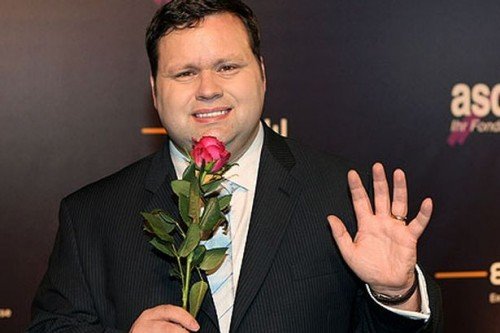
Did you ever see the YouTube video of Paul Potts from Britain’s Got Talent?
In case you haven’t, here it is:

He certainly wasn’t the most impressive looking individual. He walked out on the stage rather sheepishly, obviously feeling a little insecure. If you had been asked how to describe him, you might have said he was a little overweight with crooked teeth. It’s clear in the video that the judges weren’t expecting much.
The back-story was that by day he was a mobile phone salesman. He was earning about 30,000 quid per year, and was £38,000 in debt. He was on the brink of filing for bankruptcy and his life was going nowhere.
The judges asked him what he was there on the Britain’s Got Talent stage to do. He simply replied, “to sing opera.”
It doesn't take long before jaws begin to drop. The judges are shaking their heads in disbelief that a voice like that is coming out of the unassuming man in the ill-fitting suit standing in front of them.
Paul Potts goes on to win the entire contest. He gets a recording contract, later sings to the Queen, and records an opera album that becomes a best seller. When have you ever heard of a best-selling opera album? He went on to travel the world, living his super-power in front of hundreds of thousand of people.
He not only paid off his debts, but he got his teeth fixed too :)

Why do we love stories like his so much? Could it be because we all to some degree identify with the feeling of having a dormant super-power, an undeveloped talent that’s earning to be unleashed?
My Personal Journey of Strengths Discovery
I can relate with feeling a little insecure. One of the things I love to do now is speak in front of groups of people. But it hasn’t always been that way. In fact, there was a time when the thought of public speaking made my stomach turn. To quote Jerry Seinfeld, at a funeral, I would have much preferred to be the guy in the coffin than the one giving the eulogy.
But yet, there was a deep desire within me to be heard, to stand out, and to contribute something valuable to other people’s lives. I just didn’t know how to let it out. The talent was there in seed form, but it needed to be nurtured and developed into a strength.
One of the tools that helped me to better understand myself and begin to unleash my own inner super-powers was StrengthsFinder. Created by the Gallup Organzation, StrengthsFinder is a 100-question psychometric assessment that measures your brain function and formation, and gives labels to your most dominant talents, or potential strengths.
The assessment draws from a pool of 1000 questions. How you answer each question, determines the question you will be asked next. Once all of the questions are answered, it reports back to you on your top five out of 34 talent themes.
Like any psychometric, it relies upon your subjective responses to the questions, so it’s not perfect. But from my personal experience having taken it myself, and having personally coached dozens of other people who’ve also taken it, I’ve found it to be highly accurate and abundantly helpful as a tool for growing in self-awareness.
Why You Should Discover Your Strengths

1. Knowing your strengths can help you grow as a person.
Paul Potts invested many years in less than fruitful effort, waiting to discover what he was born to do. While he had performed as an amateur in some local operas, it was only after being validated on Britain’s Got Talent and given an opportunity to display his talent that he ultimately excelled.
Donald Clifton, one of the creators of StrengthsFinder, said,
“Every person can do one thing better than any other 10,000 people.”
What is the one thing that you can do better than 10,000 other people? Once we’ve identified that, we know where to target our own personal development in order to bring about the greatest possible growth in our lives, and then contribute the most to the lives of others.
Before I took the StrengthsFinder assessment, had you asked me what my top three to five strengths were, I wouldn’t have been able to answer, at least not coherently and with confidence. I would have fumbled around and probably said something about being a “people person” or being good with numbers.
StrengthsFinder has given me not only a greater self-awareness, to know what I have the potential of being better at than most other people, but it’s also given me a language to describe my strengths. With that language comes greater meaning and understanding.
2. Knowing your strengths can improve your relationships.
StrengthsFinder also gave me language for understanding and valuing the distinct qualities of other people, especially those who have also taken the assessment. My wife and I have found in our marriage that having an awareness of how one another’s brains are wired has been massively beneficial. It’s helped us to appreciate one another’s uniqueness, and also to work through conflict.
For example, one of my top five talent themes is called Command. People with this theme like to take charge. They feel no discomfort in imposing their views or will upon other people. But strengths also have a dark side. I can often come across at times like an insensitive asshole.
Once my wife and I took the StrengthsFinder assessment, her eyes were opened. She finally realized that when I’m confrontational, I’m not purposefully being aggressive or rude. It’s just my innate tendency to confront the brutal facts and try to push through my agenda.
My wife on the other hand is strong in one of the themes called Empathy. She has the ability to sense the emotions of the people around her. She can feel what other people are feeling, as if those emotions were her own. In fact, she really struggles seeing homeless people. She emotionally enters into their situation through her imagination and feels what it must be like to have no warm bed and no shelter.
Interestingly, we learned that according to StrengthsFinder, a person who is strong in Command should seek to partner with someone who is strong in Empathy. They are complementary strengths that both cover the other’s weaknesses well. My wife has helped me to be more mindful of how I might make other people feel. I have helped her to become more confrontational when necessary, where otherwise her empathy would hold her back in fear of hurting someone’s feelings.
This also encouraged us to see that even though we had no language for these distinct qualities previously, we were naturally attracted to one another. We intuitively knew that we needed one another. This helped to affirm that we really were a great fit.
My wife and I have done a lot of pre-marital counseling with young couples. We ask all of them do take the StrengthsFinder assessment so they can better understand one another and learn to appreciate their distinctives. It really helps to preclude a lot of conflict down the road. Rather than attempt to change their partner, they learn to value what makes them unique.
3. Knowing your strengths can make you a better team player.
Knowing our strengths helps us to know what we have the potential to be great at, and what we’ll never be anything more than mediocre at. This helps us to know where we best fit on a team. When the whole team knows one another’s strengths, each member can be confident that all of the others are playing to their strengths and contributing the most that they possibly can.
I’ve been a part of some very dysfunctional teams in my day. Let me tell you, it is not fun. All of these dysfunctional teams had one thing in common: there was no recognition and appreciating of the distinct qualities of each person. There was no celebration of what each person could uniquely contribute.
In contrast, I’ve been a part of a few amazing teams. They were amazing because each member knew their place, where they could bring the greatest contribution, and they were given the freedom to play to that strength daily. I’ve found that there are few things more rewarding than being a part of a great team.
Why not take the StrengthsFinder assessment yourself?

Anyone can purchase access to the 100-question StrengthsFinder assessment for only $15. It also comes with a digital copy of the book StrengthsFinder 2.0, which gives an introduction to the program and explains each of the 34 talent themes.
Here’s the link: https://www.gallupstrengthscenter.com/Purchase/en-US/Product
If you do decide to take the assessment and you’d like some feedback or have any questions, please send me a private message on steemit.chat. I’d love to help you better understand your strengths :)
Follow me to catch 4 more posts in this series.
Next weekend, I will meet with 50 property investors in Sydney and 40 in Melbourne. Several times per year I host these one-day workshop gatherings where I connect face-to-face with those I am mentoring. In the afternoon sessions, I am facilitating a strengths-development training. The aim is to apply these truths to the world of property investing using StrengthsFinder. Many of those I’ve mentored in the past have said that this was one of the highlights of the work we did together.
As I’ve been preparing this week for this training, I decided to package some of what I’ll be saying into this series of posts to share with you. I hope you enjoy them and find them beneficial.
Here are the upcoming posts:
- Unleash Your Super-Power, Part 2: Where Strengths Come From
- Unleash Your Super-Power, Part 3: How to Live Your Strengths
- Unleash Your Super-Power, Part 4: How to Deal with Weakness
- Unleash Your Super-Power, Part 5: Building Strong Team Relationships
Recommended Reading
- First, Break All The Rules: What the World's Greatest Managers Do Differently, by Gallup Press
- Now, Discover Your Strengths, by Marcus Buckingham and Donald O. Clifton
- Go Put Your Strengths to Work: 6 Powerful Steps to Achieve Outstanding Performance, by Marcus Buckingham
- StrengthsFinder 2.0, by Tom Rath

@jasonstaggers
image credits: fist, new and improved Paul, super-hero, strengths books
